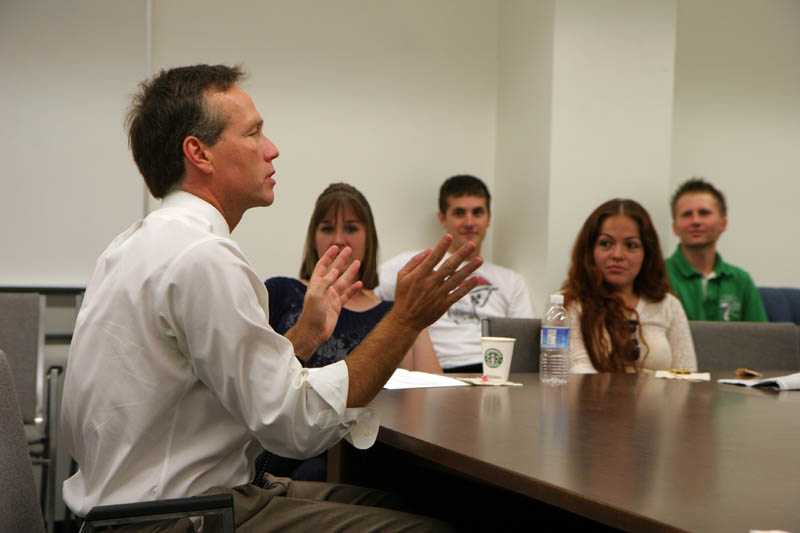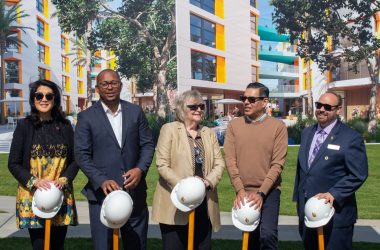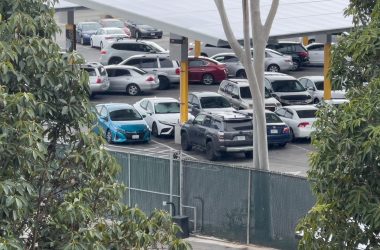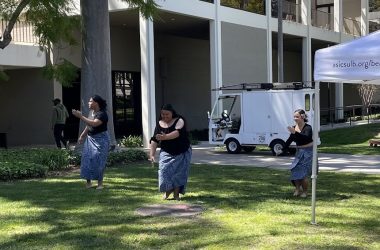President F. King Alexander entered the room, took off his coat and smiled. He took his seat at the head of the oval table, folding his coat neatly on the back of the chair.
The eyes of 28 students shifted back and forth, waiting to see whose hand would rise first.
Suraj Alva, a sophomore international studies major, raised his hand. “My teachers have been offering me extra credit to write letters to the governor and the state Legislature. Why is it important that we write to them?” Alva asked.
President Alexander rolled up his sleeves, leaned forward and began to talk.
Alva’s question was the first of 10 posed to him by students of the University Honors Program yesterday during a “coffee hour” discussion. The Coffee Hour was an opportunity for students to ask the president about anything and everything. Budget cuts, however, seemed to be the only thing on students’ minds.
“They took half the funding from higher education,” Alexander said in response to Alva’s question, emphasizing on the need to critically analyze government priorities at both the state and national levels. “We spent $16 billion on the war in Iraq and Afghanistan in the last two years. We could have built two schools in those two years.”
The president went on to speak about the politics and issues existing today in California, as well as issues he believes were ignored in previous years.
“Lately, when hard decisions are made in the government, they just ask everybody to vote on them,” he said.
He then went on to emphasize how, despite the significant cuts in education, California remains the second highest funder of the prison system in the country.
“All of these issues are questions of priorities,” he said.
Alexander said he was unsure about the future of furloughs next semester.
“We don’t know if we’re going to have furloughs anymore,” Alexander said. “It could be layoffs. It could be neither.”
Duan Jackson, UHP assistant director, asked to expand on the idea.
“Is there no hope?” she asked.
The president said hope lies in Washington, saying that the federal government is attempting to hold states responsible for their behavior. The real question is whether or not Sacramento will “whip itself into shape,” Alexander said, and start prioritizing differently.
He also went on to give advice to students on how to better handle the financial burden of education, mentioning items such as the 40 percent tax credit given to parents of low-income students.
Alexander spoke about college as an experience, encouraging students to get involved and enhance their college career outside of campus.
“College is about networking,” he said. “You’re going to have to be leaders of society sooner than you think. If you don’t, the baby boomers are going to run you all over.”
He stressed the importance of understanding “the intergenerational effects of policy making” and how resources are used and balanced.
“You got to watch out. The same people that wanted free drugs in the ’60s are wanting free drugs now,” he said, adding that the struggle for medical and other retirement benefits may have to be on students’ backs.
Alexander urged students to get involved in any way they can.
“I learn more about campus playing basketball with students than I do in my little office,” Alexander said.
He told students he has met with the other California State University presidents in many emergency meetings and continues to talk with them twice a week.
The CSU is currently “held hostage” to whatever budget is developed and handed out on Dec. 20, he said.
As he headed toward the door at the end of the hour, Alexander made sure to send students off with a positive message.
“Any time we can share life together, we can help each other out more,” he said.




